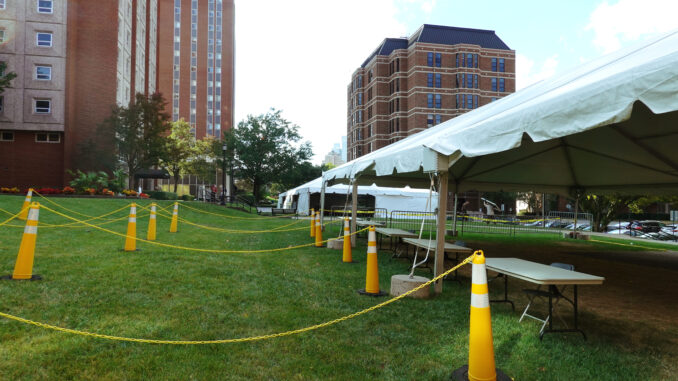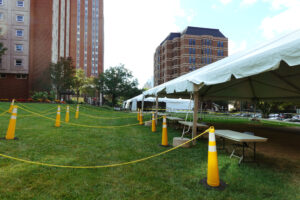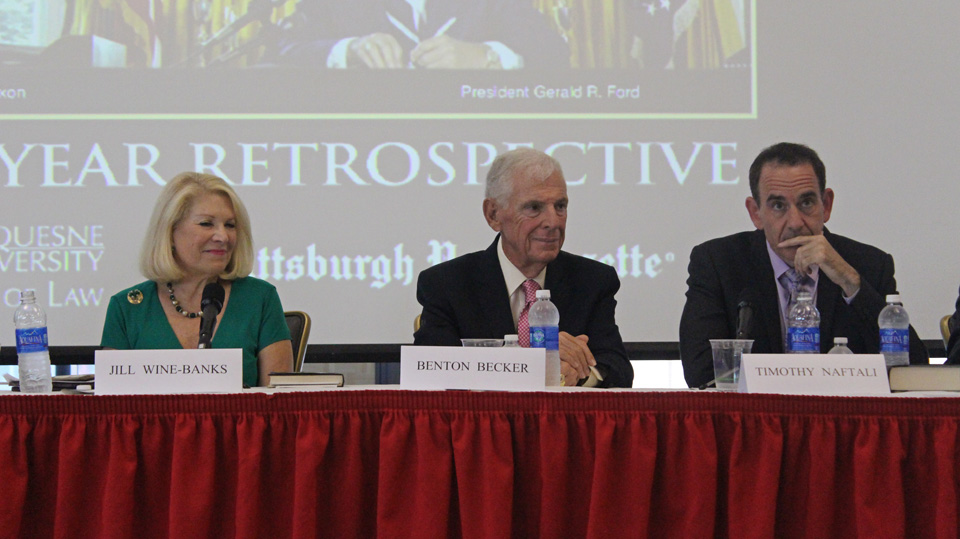
Colleen Hammond | News Editor
10/08/2020

In the coming weeks, all resident students will be tested fo COVID-19 in one of these outdoor tents on the lawn of Assumption Hall.
On many college campuses across the country who chose to open their doors this fall, the close-living quarters of the residence halls has allowed for the rapid spread of COVID-19, leading many to subsequently close their doors.
To prevent that scenario on Duquesne’s campus, all resident students are required to receive a COVID-19 test.
“For all students living in a residence hall on the Duquesne campus, testing will be required for campus residents. Those who refuse to be tested will have to leave their campus residence,” said Gabriel Welsch, vice president of marketing and communications at Duquesne.
Last week Duquesne reported 13 new cases of COVID-19, a noticeable increase from other weeks.
“Because the increase in numbers was different from the trend we had been observing, out of an abundance of caution the university is enhancing its testing, per its plan,” Welsch said.
He was also quick to assure that “individual results are kept confidential and results are only reported in total numbers.” Students’ private, medical information and test results will be kept secure and only the numerical data of cases, as well as the distinction between “student” and “employee” will be reported to the university and necessary health officials.
The new testing requirement has been well received by students and Residence Life employees alike, but many have begun to question why this did not occur sooner.
Karli Sutton, a senior biomedical engineering student and resident assistant in Assumption noted that she feels Duquesne waited too long to test all students.
“I think you should have been tested when you got your key,” Sutton said.
Sutton was not alone in her belief, as freshman and Assumption resident Zoe Ellis agreed with the sentiment.
“I think it’s something they should have done before we all moved in,” Ellis said.
Ellis and Sutton shared their fear and apprehension of returning to in-person classes and campus life, given the risks of contracting COVID-19.
“I definitely questioned how long we would be here,” Sutton said.
Despite wanting the testing to have occurred earlier, they both noted that they are pleased the university is doing it now and are pleasantly surprised with how the semester has panned out.
“I’m surprised at how well it’s gone,” Ellis said.
While her first semester of college has not quite gone as Ellis expected, she noted that she feels safe living in the dorms and thinks the majority of her fellow residents are abiding by the university’s new COVID-19 protocols and rules.
“My residents have been very, very good,” Sutton said. “I can’t say the same for all residents.”
This was echoed by Sutton’s co-worker, fellow Assumption resident assistant, junior Steven Loebig. While Loebig stated that the majority of his residents have been abiding by the safety precautions, he noted the presence of a few “smug” residents who feel they can skirt the mask mandates while on the floor.
“The only thing I’m asking is that you wear a mask when you leave your room,” Loebig said.
Loebig, who also works in a local nursing home, has already been tested on three separate occasions since the pandemic broke out in early March. His frequent testing is a result of his work and a need to protect the residents of the nursing home. As a veteran COVID-19 test recipient, Loebig assured students that the test is not painful, only slightly uncomfortable.
“You feel it for a second, and then you’re done and you’re fine,” Loebig said.
He noted that there is nothing to fear in the test, and that getting one is for the general health and safety of the community.
“This is a good thing the campus is doing,” Loebig said.
However, many fear that these efforts are too little, too late on the part of the university.
“I think there was a false sense of confidence,” Sutton said. “It’s definitely here.”
In September, to combat the spread of COVID-19, the university conducted “random testing” for students, staff and faculty.
“The university conducted COVID-19 tests for 724 randomly selected students and employees who are regularly physically present on campus this fall. The results of this testing are as follows: 719 tests were tested by Quest.719 tests were negative,” said a statement sent to students signed by Provost David Dausey and senior vice president of student life Doug Frizzell.
Despite none of the random tests coming back positive, student fears over COVID-19 on campus have not been entirely quelled.
“Unless they got really, really lucky with the testing, it (zero positive cases) seems unlikely,” Sutton said.
She also noted that six of her 25 residents have returned home for the remainder of the semester out of fear of contracting the virus.
“I can’t control what they do outside the building,” Loebig said. “It isn’t a matter of if people get it, it’s when.”
The spread of COVID-19 has been a staple of discussion on campus as students, faculty and staff adapt to the new and ever-evolving rules and restrictions.
“I think any student who comes to campus should get tested,” Sutton said.
While the official plans for testing commuter students have not been released yet, Welsch stated that they plan to test all students who spend time on campus.
“Plans for students living off-campus but attending in-person classes will be communicated soon,” Welsch said.
Plans to test all on campus faculty and staff have not been communicated yet, leaving some students frustrated.
“It feels like there’s a bit of a double standard,” Sutton said.
Sutton noted that she has seen staff and faculty disobeying mask mandates or not wearing their masks properly in recent weeks. She feels staff and faculty are not reprimanded in the same way students are — that students face tougher consequences for disobeying the COVID-19 restrictions than Duquesne employees.
Although plans for commuters and Duquesne employees are still up in the air, resident students can schedule their test for a half hour time slot online. All resident students should have received an email from the university with a link to schedule a time to get tested.
“The University is working on a process for test scheduling that will accommodate a degree of flexibility should an individual miss a test time, though we are encouraging people to select their time carefully and make every effort to keep that time,” Welsch said.
Ellis stated she found the system intuitive and that a wide variety of time slots were available.
“It was very easy,” Ellis said.
Welsch has stated that students who refuse to comply with the testing will be asked to leave. Loebig encourages students to schedule a test, keep their time slot and abide by all COVID-19 restrictions and protocols.
“It’s not for you, it’s for the safety of everyone else on campus,” Loebig said.




